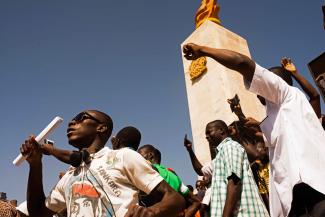News
In brief

Regime change in Burkina Faso
In mid-November, Michel Kafando took office as transitional president of Burkina Faso. His mission is to prepare the country for elections in November next year.
Kafando will not be allowed to run. He was chosen by a committee composed of representatives of the armed forces, civil society, opposition organisations and faith-based groups. Kafando told journalists after being appointed: “The committee has just designated me to guide temporarily the destiny of our country. This is more than an honour.”
A few weeks earlier, broad-based protests had toppled Blaise Compaoré, who was Burkina Faso’s president for 27 years. The protests erupted when Compaoré attempted to change the constitution in order to be allowed to run for another term. Young people in particular opposed his plan. Many of them stated that they admired Thomas Sankara, the leftist military leader who had governed the country for four years before being killed in the coup that brought Compaoré to power in 1987. Compaoré later won elections in 1991, 1998, 2005 and 2010. He was considered an ally of the west. In the current crisis, the military grabbed power and suspended the constitution. Under pressure from the African Union, however, it eventually agreed to establish a civilian government. Military leaders proposed Kafando to become Burkina Faso’s transitional head of state. He is a former foreign minister. (dem)
G20 demand action on climate change
Even though the Australian government, the host of the G20 summit in Brisbane in November, did not want global warming to be part of the agenda, other participants insisted on discussing the matter.
The final communique calls for strong and effective action to address climate change. It spells out the need to reach a legally binding agreement on curbing carbon emission at the UN climate summit in Paris next years. US President Barack Obama committed $ 3 billion to the Green Climate Fund, and the Japanese government pledged $ 1.5 billion.
Ahead of the summit, Obama and China’s President Xi Jinping had met in Beijing where they agreed that there is a need to commit to limiting carbon emissions. Obama pledged the USA would reduce emissions by at least 26 % in the two decades from 2005 to 2025. He does not need majorities in Congress to implement this policy through executive action in the rest of his term in office. Xi promised China’s emissions would peak around 2030. Environmentalists immediately pointed out that these pledges are not enough to limit global warming to two degrees on average. Political observers, however, welcomed the fact that Obama and Xi were prepared to make binding commitments. Both nation’s refusal to do so has blocked climate negotiations for years.
The G20 summit was marked by the controversy over the crisis in the Ukraine. Russian President Vladimir Putin left early after facing criticism from many participants.
The summit discussed a series of measures to boost the world economy. Fighting corruption and stemming tax evasion are on the agenda. Participants reckon that all measures, if implemented, could lift the G20’s combined GDP by an additional 2.1 % in the next three years. (dem)







